PsychNewsDaily Publishers
100 Summit Drive
Burlington, MA, 01803
Telephone: (320) 349-2484
PsychNewsDaily Publishers
100 Summit Drive
Burlington, MA, 01803
Telephone: (320) 349-2484
The full moon influences sleep patterns, causing individuals to go to bed later and experience reduced sleep duration by 20 to 90 minutes on average.
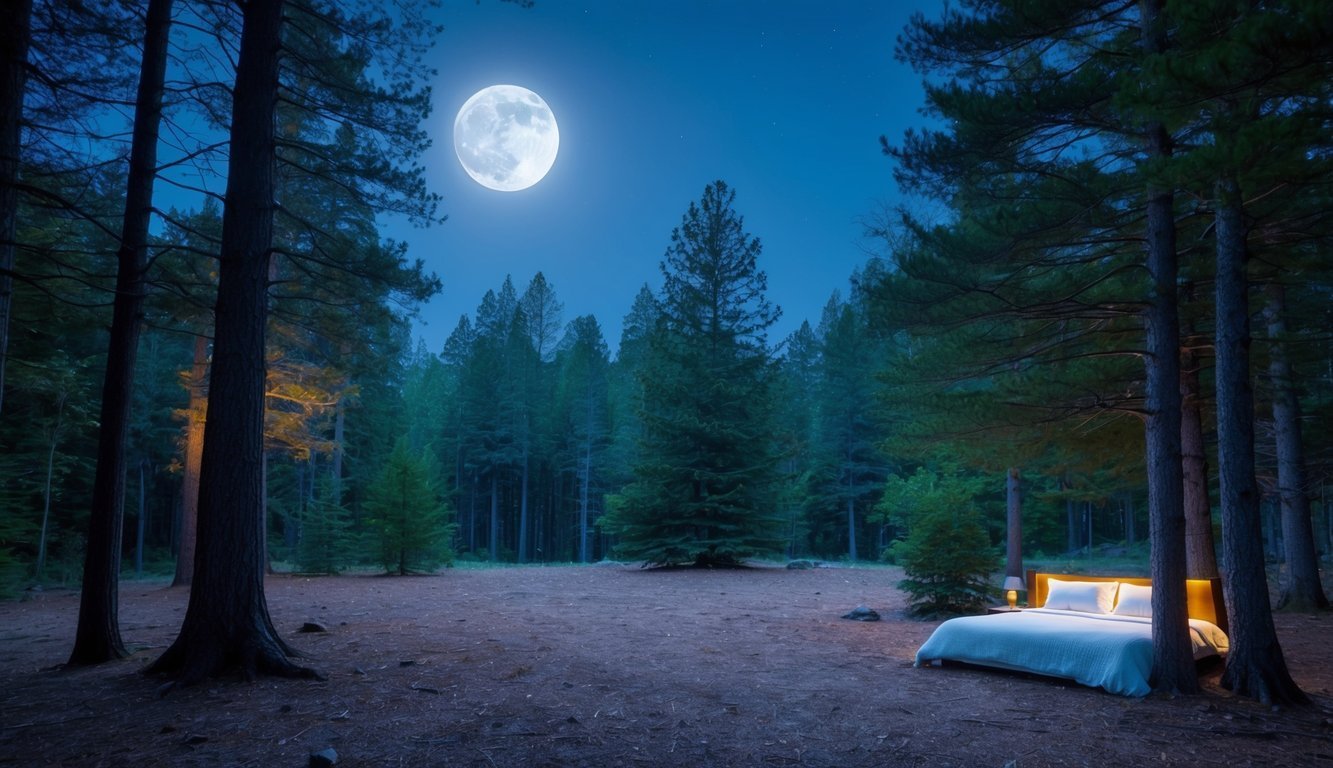
As the full moon approaches, many people may notice changes in their sleep patterns. A recent study highlights these effects, revealing that individuals tend to go to bed later and sleep less in the days leading up to a full moon. This shift in sleep timing is linked to the increased brightness of moonlight during evening hours, which can disrupt regular sleep routines.
Researchers have found a strong connection between lunar cycles and human sleep behavior. On nights before a full moon, it appears that people struggle to fall asleep as easily, leading to shorter sleep durations. This phenomenon is not just a coincidence; it reflects a synchronization between human activity and natural lunar rhythms.
Understanding how moonlight influences sleep can help people make better choices for their rest. By being aware of these patterns, one can take steps to improve sleep quality during this time.
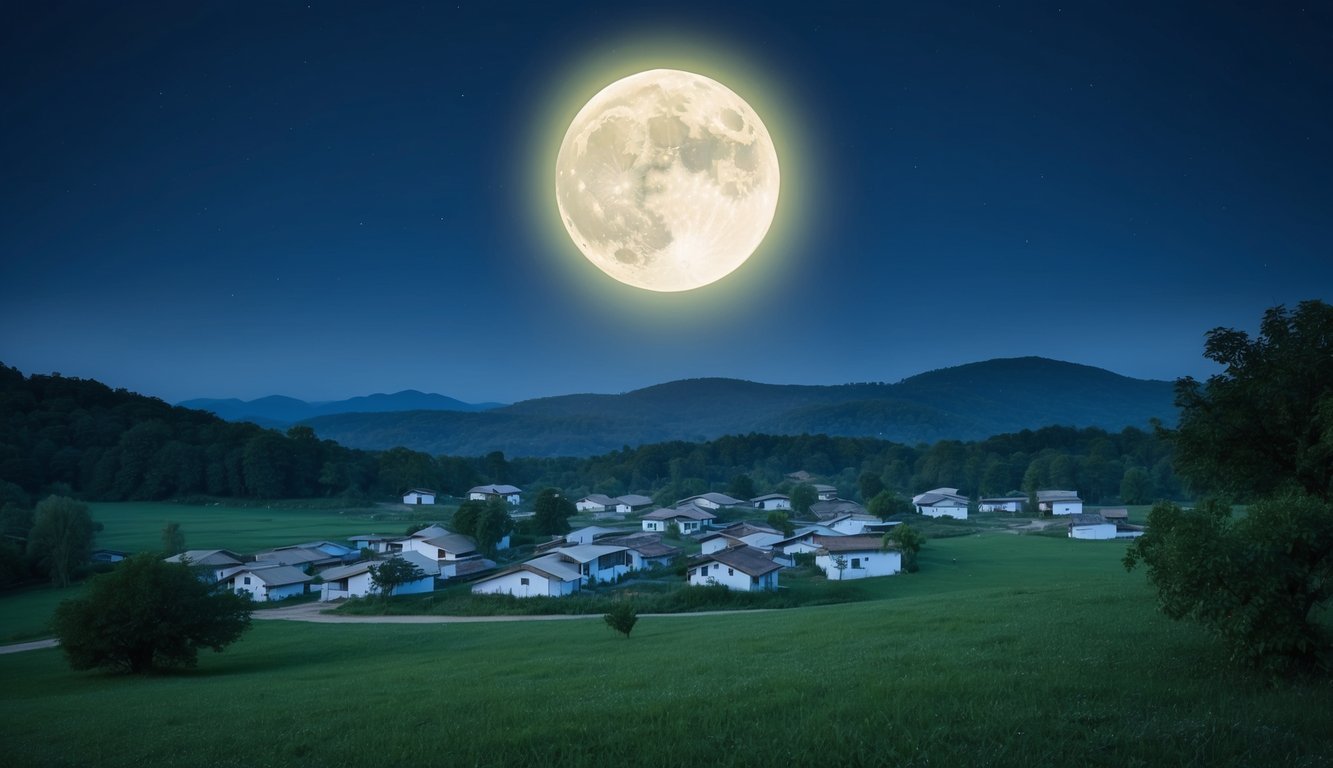
The way people behave can be influenced by the moon. Research shows that as the full moon approaches, sleep patterns change. This section explores historical beliefs about the moon and modern research on its effects on sleep.
Throughout history, many cultures believed that the moon affected human behavior. Ancient Greeks linked the moon to sleep and mental health. They thought that moonlight could cause madness or strange dreams.
Folklore Examples:
These beliefs often stemmed from observations. People noticed that they felt more restless or slept less during full moons. Such ideas were common before scientific studies took place.
Recent studies support some ancient beliefs about the moon. Research has shown that sleep can be affected by lunar phases.
During the nights leading up to a full moon, people tend to go to bed later. They sleep less overall, reducing their sleep by 20 to 90 minutes.
Key Findings:
This connection indicates that moonlight might play a role in modern sleep habits. Scientists continue to explore how these changes happen and why.

Moonlight can influence how people sleep. As the full moon approaches, natural light from the moon may cause changes in sleep patterns, including staying up later and getting less sleep. This section will look at how moonlight affects sleep compared to artificial lights.
Natural light, especially moonlight, has a unique impact on sleep. Studies show that moonlight affects human behavior and sleep cycles. In the days leading up to a full moon, people usually go to bed about 30 minutes later.
Additionally, they often sleep 46 to 58 minutes less per night. This change occurs when moonlight is bright enough to affect a person’s sleep environment. The brighter moonlight can disrupt the melatonin levels in the body, leading to difficulties in falling asleep.
Moonlight is different from artificial lighting, like electric lights. While electric lights are constant and can be very bright, moonlight is softer and changes nightly. The presence of bright streetlights or screens may mask the effect of moonlight, but during clear nights, natural light can still play a significant role.
People exposed to both types of light may experience various sleep patterns. Moonlight tends to have a calming effect, but it can also lead to later bedtimes. Unlike electric light, moonlight’s subtle glow can enhance the body’s natural rhythms in different ways.
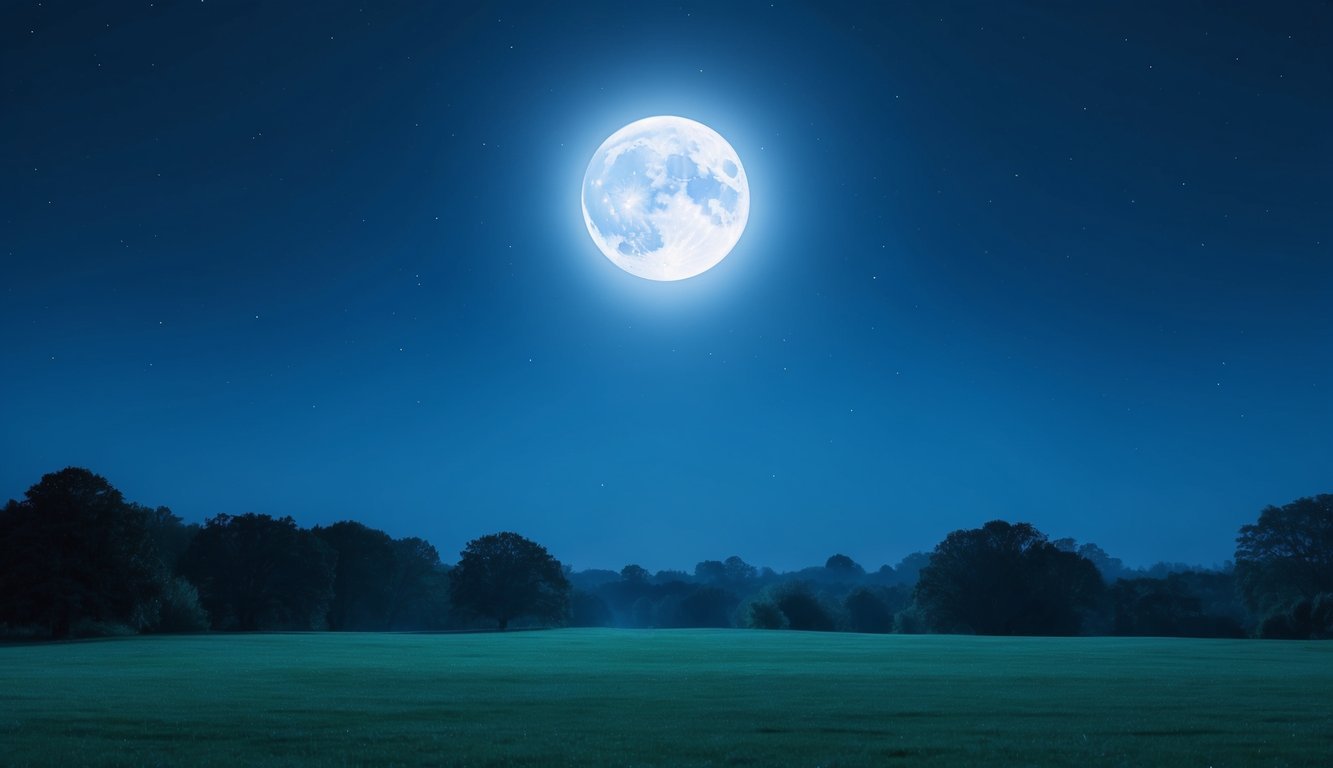
The full moon can influence how people sleep. Studies show that many individuals go to bed later and sleep less as the full moon approaches. Understanding these changes can help people manage their sleep better.
Research indicates that people tend to start their sleep later on nights leading up to a full moon. This shift happens because the increased brightness from the moon can make it harder to fall asleep.
For instance, when moonlight is strong, many individuals find themselves feeling more awake and alert. This extra light can confuse the body’s natural sleep cues. As a result, falling asleep becomes more challenging, which can lead to a disrupted sleep schedule.
Studies show that people may sleep less during the nights before a full moon. On average, individuals report losing about 20 minutes of sleep during this time.
This reduction in sleep duration can impact mood and alertness. People may find it harder to concentrate the next day. Tracking sleep patterns during full moons can help individuals understand this effect better.
By recognizing these changes, they can make adjustments, like reducing screen time or creating a darker sleeping environment, to improve their rest.
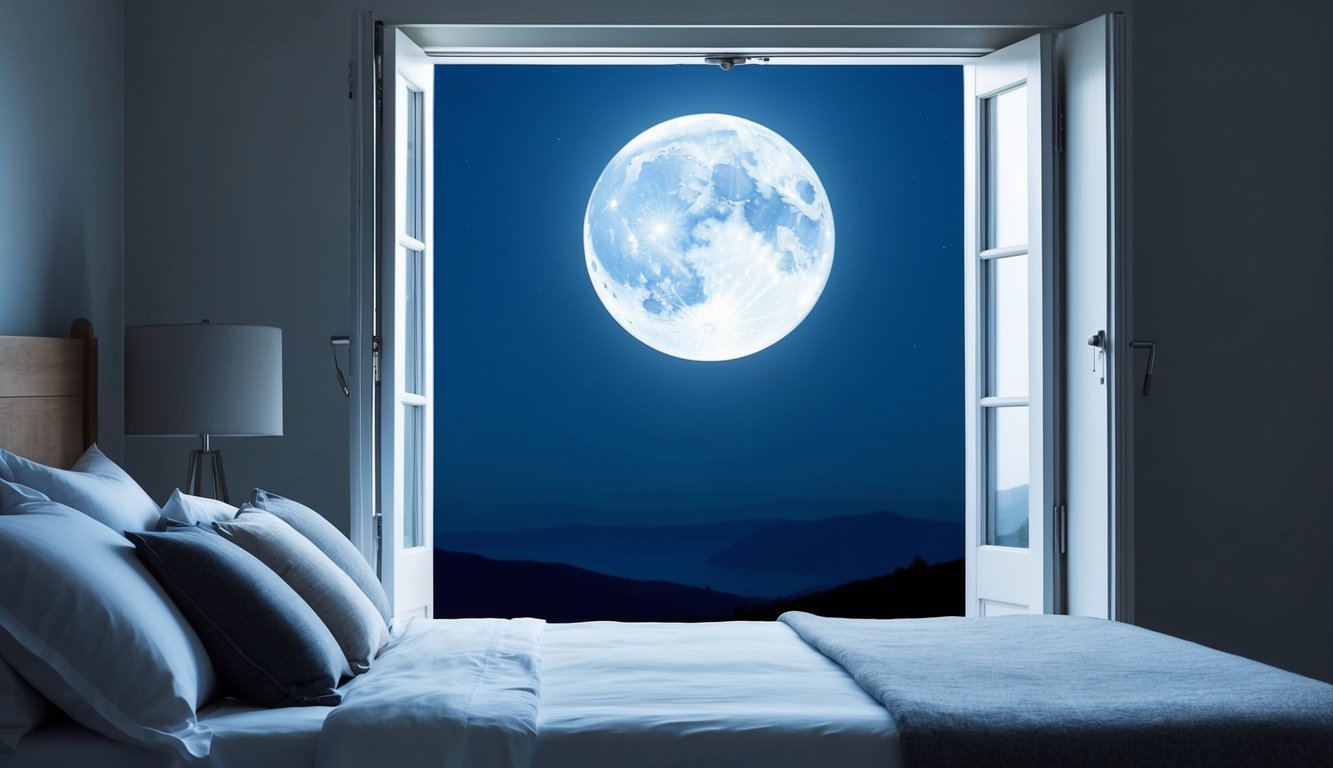
When the full moon approaches, many people may experience changes in their sleep patterns. Adjustments to home lighting and implementing effective sleep hygiene practices can help manage these disturbances.
The brightness of the moon can disrupt sleep by mimicking daylight during night hours. To combat this, individuals can use blackout curtains or shades in their bedrooms. This simple change can block out unwanted light and create a darker sleeping space.
Additionally, minimizing exposure to electric light an hour before bed can help. Using dim, warm lighting in the evening prepares the body for sleep. Consider switching to soft yellow or orange bulbs, as they are less likely to interfere with sleep.
Smart lighting options allow users to gradually reduce light levels in the evening. This gradual dimming signals the body that it’s time to wind down and helps promote better sleep.
Establishing a bedtime routine can also enhance sleep quality. Going to bed at the same time each night helps regulate the body’s internal clock. A consistent schedule may reduce the impact of lunar cycles on sleep.
Engaging in relaxing activities before bed, such as reading or meditation, can further promote restful sleep. Avoiding heavy meals and stimulants like caffeine in the evening also supports better sleep hygiene.
Keeping the bedroom cool, quiet, and comfortable is crucial. Using white noise machines or earplugs can help mask disruptive sounds, while comfortable bedding can make it easier to fall asleep. Together, these practices can effectively adjust to the sleep disturbances associated with the lunar cycle.
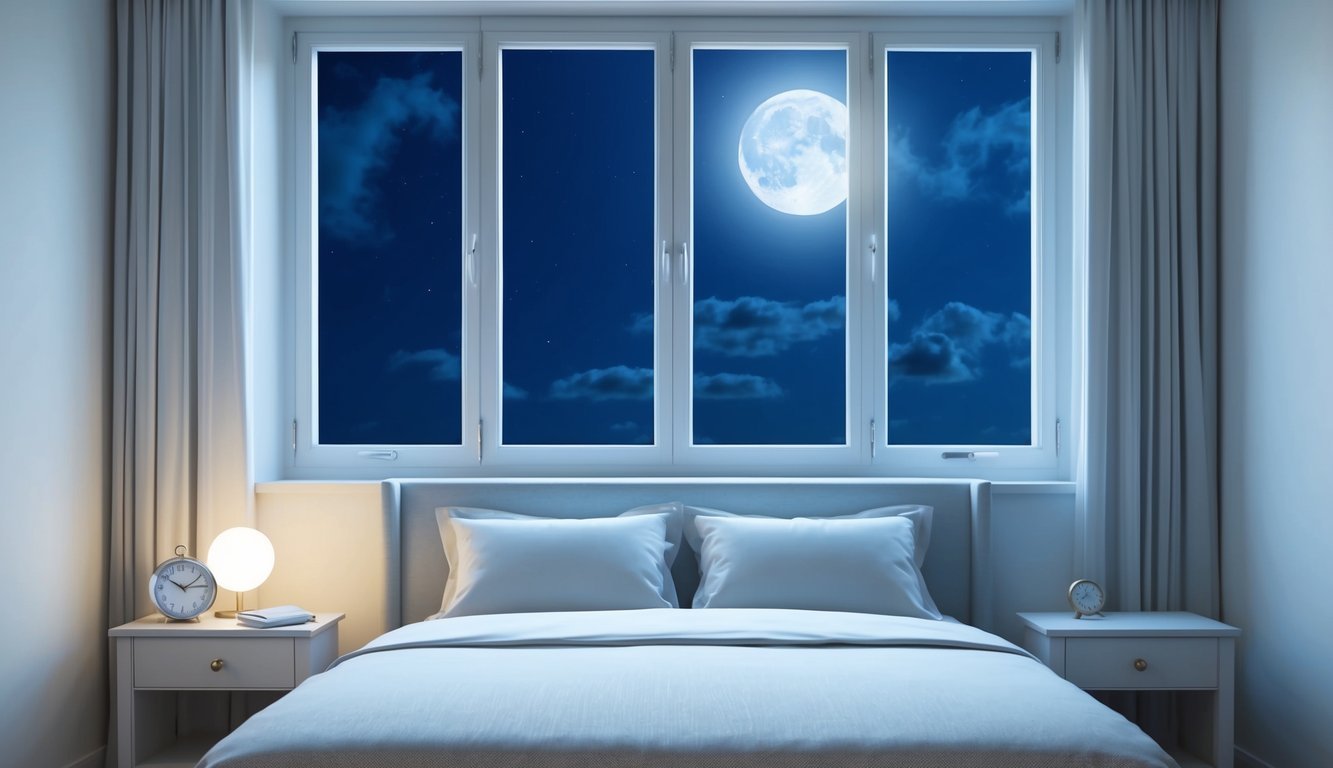
Understanding the effects of the moon on sleep can help improve wellness and sleep quality. It also emphasizes the importance of creating sleep-friendly environments, especially during full moon phases.
Research indicates that the days leading up to a full moon can affect sleep quality. On average, people may lose about 46 to 58 minutes of sleep each night. This reduction can lead to sleep deprivation, which affects mood, focus, and overall well-being.
During this period, individuals should prioritize good sleep hygiene. Here are some tips:
By recognizing lunar patterns, individuals can take steps to safeguard their sleep quality and health.
It is essential to create a sleep environment that promotes better rest, especially during full moons. Here are some effective strategies:
Simple adjustments to the sleep environment can make a big difference. By focusing on these aspects, individuals can enhance their sleep quality even during full moon phases.

Many people wonder about the connection between the moon and sleep. Some studies show that sleep patterns can change as the moon phases shift. Here are some specific questions often asked on this topic.
The full moon may lead to shorter sleep times for some because of increased light at night. This can disrupt the body’s natural sleep cycle. People might also feel more active and awake during this time.
Yes, research has found a link between moon phases and sleep. Some studies show that as a full moon approaches, people go to bed later and get less sleep. This connection suggests that lunar cycles might impact human behavior and rest.
To improve sleep during a full moon, people can try black-out curtains to block moonlight. Establishing a calming bedtime routine can also help. Relaxation techniques like reading or meditating before bed can support better sleep.
Unlike the full moon, the new moon phase usually offers less light at night. Some individuals might find it easier to sleep during this phase. The darker nights may promote a more restful environment.
A lunar eclipse might cause disturbances similar to a full moon. The unusual event can create excitement or anxiety, keeping some people awake. The change in light during an eclipse can also disrupt sleep patterns for sensitive individuals.
Many cultures have beliefs about the moon’s impact on sleep. Some people think that moonlight can cause restlessness or bad dreams. Others believe that sleeping under a full moon might bring good luck or heightened creativity.